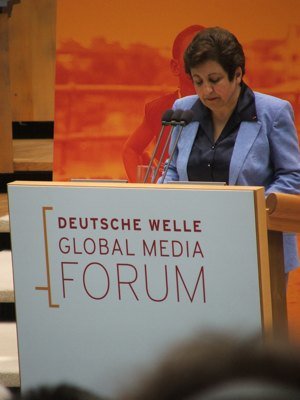
The Deutsche Welle Global Media Forum, kicked off yesterday in Bonn, Germany. After a couple of welcoming speeches by the director of Deutsche Welle and a local minister, Shirin Ebadi took the podium. Just a minute before she started, someone announced that she will speak in in farsi, sending almost everyone scrambling for the translation headphone booth outside the hall.
Ebadi, who won the Nobel Peace prize in 2003 gave a quite balanced speech that condemned the curtailment of freedom of expression both in developing countries like Iran, but also in the West, emphasizing that freedom of expression is the first step to democracy.
She was bitter in criticism of the state of expression in her native Iran. Censorship in Iran extends to books of secular and feminist writers, the imprisonment of bloggers and journalists, revocation of the licenses of many publications and religious police practices. She mentioned many imprisoned journalists and banned publications by name.
Ebadi said that state censorship leads to fear and, inevitably, self censorship, which is kills any creativity in individuals.
On the other hand she warned against falling into the trap of warmongers and those who fan the flames of the “clash of civilizations”. She criticized the common western journalistic practice of mentioning the nationality and religion of terror suspects (phrases like “Islamic terrorism”).
Ebadi also talked about covert censorship in the West that didn’t use imprisonment of journalists of banning publications. This covert censorship is achieved through economic strangulation practiced by mega-media corporations that have effectively become monopolies, concentrating financial capital and power in the hands of a small group of people. She citied the TimeWarner-AOL mega merger as an example. She said that independently-minded journalists cannot work within this framework.
Finally, Ebadi talked about internet filtering and the growing information gap in the wold: in the West there is 1 computer per 2 people while in Angola there is 1 computer per 3000 people. “This is an uneven race who’s outcome is predetermined,” she said.
Read more about Ebadi’s speech and about the Forum on Afriquenligne.